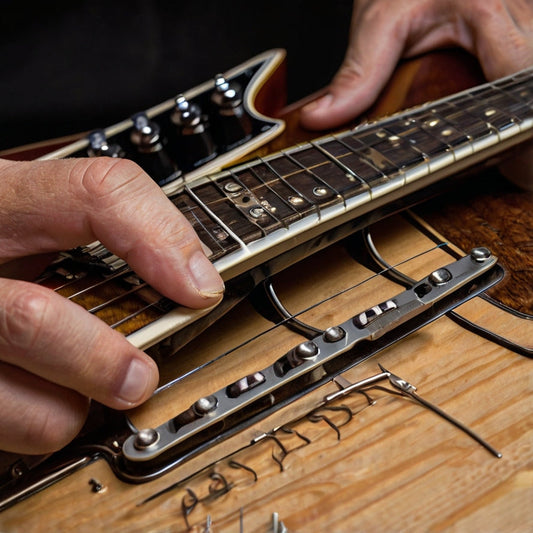The Roaring Seventies: The Definitive Guide to 70s Rock Bands
The 1970s were more than just a decade—they were a revolution in sound. This golden age of music gave birth to some of the most iconic 70s rock bands that forever changed the landscape of rock. With vinyl spinning in teenage bedrooms and stadiums roaring with the energy of electric guitars, the '70s carved out an unforgettable legacy.
But what is it about these 70s rock bands that still captures our imagination decades later? Perhaps it's their raw authenticity, the poetic rebellion in their lyrics, or simply the unforgettable riffs that defined a generation. In this guide, we revisit the legends, the genres, and the timeless power of '70s rock music that still resonates today.

Unearthing the Legends: A Comprehensive Look at 70s Rock Bands
The '70s were not a monolith; they were a melting pot of musical styles. From the thunderous power of hard rock bands like Led Zeppelin and Deep Purple to the mind-bending artistry of progressive rock giants like Pink Floyd and Yes, 70s rock bands embraced innovation.
Glam rock brought theatrical flair and glitter-soaked performances with acts like T. Rex and David Bowie. Meanwhile, punk rock exploded toward the decade's end, with bands like The Ramones and The Clash offering a raw, stripped-down response to rock excess.
What ties these diverse styles together? A few key elements:
-
Commanding vocals that could soar or snarl.
-
Guitar solos that felt like sonic sermons.
-
Complex compositions that invited listeners to dive deeper.
-
A spirit of rebellion, freedom, and unfiltered emotion.
Whether you're searching for a "70s rock bands list" or simply exploring the sound that defined an era, this section celebrates the rich variety of voices that shaped rock history.
A-Z of Anarchy and Anthems: Iconic 70s Rock Bands Alphabetical
If you've ever Googled "70s rock bands alphabetical," you're not alone. For collectors, historians, and fans alike, here's a curated list of influential 70s rock bands from A to Z, with a deeper dive into their sound, stories, and legacy:
Aerosmith
Hailing from Boston, Aerosmith emerged in the early '70s with a raw blend of blues-rock swagger and gritty energy. Often dubbed the "Bad Boys from Boston," their music balanced Joe Perry’s scorching guitar riffs with Steven Tyler’s electrifying vocals.
Their 1973 debut album introduced the haunting ballad "Dream On," which became a slow-burning hit and a defining anthem of the decade. "Sweet Emotion" and "Walk This Way" followed, cementing their place in rock royalty.
Aerosmith's sound, equal parts sleaze and soul, helped shape the future of American hard rock and influenced countless bands that followed.

Black Sabbath
Formed in Birmingham, England, Black Sabbath are widely regarded as the godfathers of heavy metal. Their 1970 self-titled debut and follow-up Paranoid unleashed dark, sludgy riffs and eerie lyrics.
Tony Iommi's down-tuned guitar and Ozzy Osbourne’s haunting voice created a sound that would launch an entire genre. Songs like "Iron Man" and "War Pigs" are still thunderous decades later.
Creedence Clearwater Revival
Though rooted in California, CCR’s sound evoked the American South with its swamp rock grit. Songs like "Proud Mary" and "Fortunate Son" channeled social unrest and blue-collar stories. With John Fogerty’s unmistakable growl and concise, punchy arrangements, CCR offered a raw, roots-driven alternative to psychedelic excess.
Deep Purple
Deep Purple pushed boundaries by blending classical music complexity with hard rock. Their 1972 hit "Smoke on the Water" features one of rock’s most iconic riffs. Albums like Machine Head and In Rock showcased the prowess of Ritchie Blackmore on guitar and Jon Lord’s swirling Hammond organ. They laid the foundation for future progressive and metal acts.
Electric Light Orchestra (ELO)
Under the guidance of Jeff Lynne, ELO fused rock with classical elements and futuristic synths. Their lush orchestration and sci-fi themes set them apart. Tracks like "Mr. Blue Sky" and "Evil Woman" blended Beatles-esque melodies with modern innovation, capturing both nostalgia and novelty.
Fleetwood Mac
Initially a blues band, Fleetwood Mac reinvented themselves in the '70s with Lindsey Buckingham and Stevie Nicks. Their 1977 masterpiece Rumours is one of the best-selling albums ever, offering a deeply personal narrative of love, betrayal, and reconciliation. Songs like "Go Your Own Way" and "Dreams" still echo with emotional power.

Genesis
Genesis began as a progressive rock outfit led by Peter Gabriel, known for his theatrical performances and surreal lyrics. Albums like The Lamb Lies Down on Broadway offered conceptual depth and experimental soundscapes.
When Phil Collins took over vocals, the band transitioned toward a more accessible pop-rock style while maintaining intricate musicianship.
Heart
Sisters Ann and Nancy Wilson brought fierce femininity to a male-dominated rock scene. Heart combined Zeppelin-style hard rock with acoustic ballads.
"Barracuda" remains a thunderous anthem, while "Crazy on You" showcases Ann’s vocal prowess. They opened doors for women in rock with both skill and charisma.
Iron Maiden
Although they rose to prominence in the '80s, Iron Maiden’s roots stretch back to the late '70s, when they helped pioneer the New Wave of British Heavy Metal. With galloping rhythms, operatic vocals from Bruce Dickinson, and epic themes, Iron Maiden turned metal into mythology.
Judas Priest
Emerging from Birmingham, Judas Priest sharpened the steel of heavy metal with twin guitars and Rob Halford’s powerful range. Their 1978 album Stained Class and later hits like "Breaking the Law" established them as metal trailblazers, blending speed, melody, and rebellion.
KISS
Known as much for their theatrical performances as for their music, KISS turned concerts into spectacles. Hits like "Rock and Roll All Nite" and "Detroit Rock City" captured their raw, unapologetic energy.
Behind the face paint and fire, they created a marketing empire and influenced glam and arena rock.
Led Zeppelin
Perhaps the most influential band of the decade, Led Zeppelin married blues with mysticism and unmatched musicianship. From the epic “Stairway to Heaven” to the thunder of “Whole Lotta Love,” they elevated rock to mythic proportions. Jimmy Page’s guitar wizardry and Robert Plant’s wails made every track unforgettable.
Meat Loaf
With Bat Out of Hell, Meat Loaf and songwriter Jim Steinman crafted a rock opera filled with bombast and drama. Songs like "Paradise by the Dashboard Light" were theatrical epics that stood apart from radio fare. The album became one of the best-selling of all time.

Nazareth
This Scottish band carved out a niche with their gritty blend of blues and hard rock. "Love Hurts" remains their best-known track—a raw, emotive ballad that showcased their softer side. Their sound laid groundwork for later hair metal acts.
Pink Floyd
Masters of the concept album, Pink Floyd crafted immersive sonic worlds. Dark Side of the Moon and The Wall weren’t just records—they were experiences. With David Gilmour’s soulful solos and Roger Waters’ philosophical lyrics, they redefined rock as art.
Queen
Equal parts virtuosity and spectacle, Queen could turn opera into rock and vice versa. Freddie Mercury’s iconic voice powered hits like “Bohemian Rhapsody,” “We Will Rock You,” and “Somebody to Love.” They were genre-defying and timelessly innovative.
Ramones
Stripping rock back to its essentials, the Ramones launched punk with breakneck speed and leather-clad attitude. Tracks like "Blitzkrieg Bop" and "I Wanna Be Sedated" were short, loud, and unforgettable. They proved that simplicity could be revolutionary.
Santana
Carlos Santana brought Latin fire to rock music. His guitar tone—fluid, lyrical, and emotive—defined tracks like "Black Magic Woman" and "Oye Como Va." His band’s fusion of jazz, rock, and Latin rhythms expanded the genre’s borders.
Thin Lizzy
Led by the charismatic Phil Lynott, Thin Lizzy merged poetic lyricism with hard rock muscle. “The Boys Are Back in Town” became a summer anthem, while their twin-guitar harmonies influenced countless metal and rock bands.
Uriah Heep
With fantasy-tinged lyrics and a sound that bridged prog and hard rock, Uriah Heep delivered powerful albums like Demons and Wizards. Their swirling organs and soaring vocals gave them a distinct place in 70s rock mythology.
Van Halen
Exploding onto the scene in 1978, Van Halen redefined guitar heroics. Eddie Van Halen’s tapping technique was a revelation. Their self-titled debut, with tracks like “Runnin’ with the Devil,” set the bar for American hard rock heading into the '80s.

ZZ Top
Blending Texas blues with rock and a sense of humor, ZZ Top delivered swagger in spades. "La Grange" and "Tush" showcased their raw power, while their later embrace of synthesizers proved their adaptability. Their long beards became as iconic as their riffs.
This expanded alphabetical journey doesn’t just name names—it reintroduces you to the spirit, style, and sound that made 70s rock bands legendary.
The British Invasion's Enduring Legacy: Key 70s Rock Bands UK
UK bands like The Rolling Stones, The Who, and Status Quo maintained dominance throughout the '70s. Their influence shaped global music trends and gave British rock its lasting prestige.
Stateside Superstars: American 70s Rock Bands from the US
Across the Atlantic, Bruce Springsteen, The Eagles, and Lynyrd Skynyrd led a uniquely American charge—rich in storytelling and Southern rock fire.
Leading Ladies of Rock: Influential 70s Rock Bands with Female Singers
Bands like Heart and Jefferson Starship paved the way for women in rock, blending vocal power with lyrical strength.
Still Rocking: 70s Rock Bands on the Road Today
Believe it or not, many 70s rock bands are still touring in 2025, proving that their music—and energy—are far from fading.
-
The Rolling Stones — Still strutting stadiums with timeless swagger.
-
Aerosmith — Their farewell tour in 2025 promises emotional high notes.
-
KISS — Their theatrical shows continue to captivate new generations.
-
Santana — Carlos Santana's guitar still sings with soul and fire.
Fans searching for "70s rock bands touring 2025" or "70s rock bands still touring" can look forward to a lineup of living legends bringing classic rock back to the stage.
The Enduring Echo: Why 70s Rock Bands Continue to Captivate
What keeps the flame alive? It’s more than nostalgia. 70s rock bands embodied an era of transformation. They weren’t just making music—they were shaping culture, politics, and identity.
From vinyl to streaming, from garage posters to Spotify playlists, their songs still speak to rebellion, passion, and authenticity. It’s why teenagers today wear Led Zeppelin shirts and discover the poetry of Pink Floyd.
Whether you're a lifelong fan or a curious newcomer, exploring "70s rock bands" means diving into the heart of modern music history.
Conclusion: Long Live 70s Rock Bands!
The 1970s were a time when rock wasn’t just music—it was a movement. These bands weren’t just performers; they were revolutionaries with guitars, redefining what music could be.
So crank up the volume, dust off your vinyl, and take a ride through the roaring seventies. Long live the legends. Long live 70s rock bands!



